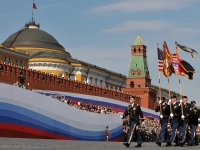Registration
You will receive an email confirming your registration.
IMGXYZ2576IMGZYXThe mood surrounding Dmitry Medvedev’s trip to Silicon Valley and to Washington, D.C., is noticeably more positive than during previous visits. Angela Stent, director of the Center for Eurasian, Russian and East European Studies at Georgetown University in Washington, D.C., spoke about U.S.-Russian relations at the Carnegie Moscow Center. Carnegie’s Dmitri Trenin moderated.
Obama’s Domestic and Foreign Policy Challenges with Regard to Russia
According to Stent, the evolution of the current U.S.-Russian relationship must been viewed within the broader context of U.S. domestic and foreign policy. The Obama administration inherited a number of problems from its predecessor, and the current president will be judged on the handling of these challenges. The key challenges where the administration would like to get Russia’s backing are the issues of Iran and Afghanistan
However, President Obama faces a host of other challenges, including the continuing impact of the global financial crisis, housing foreclosures, and unemployment. The BP oil spill, Stent pointed out, has brought the president’s approval ratings lower than President Bush’s in the wake of Hurricane Katrina. Domestic disagreements over the correct strategy toward Afghanistan, as well as the situation in Iraq, continue to preoccupy the administration.
New U.S. Approach to Russia
The new U.S. National Security doctrine depicts Russia as a nation with significant influence and as a partner – not as an adversary. Stent argued that the United States seeks a relationship with Russia that is multi-dimensional, stable, and based on mutual interests.
What Is in the Reset?
U.S.-Russian relations have undergone a reset, as the United States seeks to enlist Russia’s cooperation in dealing with Iran and Afghanistan. Although the expectations of the reset differ in the two countries, the initiative has already seen some significant achievements.
- Personal Relations: President Obama has downplayed the personalization of relations, putting them on a more solid ground. The ties between the two presidents remain very important, however, in the improved relations between the two countries.
- Victory Day: In an important symbolic gesture, U.S. troops marched in the Red Square on the Victory Day.
- New START: The United States and Russia have signed the New START Treaty, which deals with nuclear weapons issues left over from the Cold War.
- Kyrgyzstan: Before the recent unrest in the country, an agreement was made that allowed a Russian military base to be set up in the country – alongside with the existing U.S. military transit center.
- Trade and Technology: Bilateral trade grew by 20 percent in 2009. The United States is now the second largest destination for Russia’s direct foreign investment. President Medvedev has visited the Silicon Valley.
Reset Challenges Mitigated
Several factors made the U.S.-Russian reset easier, Stent noted, among them: the ebbing of the Russian gas wars, the U.S. prioritization of relations with Russia within the post-Soviet space, and U.S. recognition of the real need to improve bilateral relations in order to achieve other foreign policy goals. Ukraine’s election of a more pro-Russian president has also made the reset easier on the United States, especially given that the current administration has placed relations with the countries of the former Soviet Union at a lower priority than its predecessor.
Looking to the Future
Stent listed a number of bilateral issues that will affect future U.S.-Russian relations, including further discussions of arms control, disagreements over tactical nuclear weapons, Euro-Atlantic security architecture, joint U.S.-Russia ballistic missile defense, Russia’s relationship with NATO, energy security, and instability in Central Asia.
